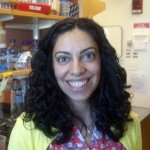The Biological Sciences School is excited to welcome four new faculty members. The new faculty will add their expertise to our already highly ranked Biological Sciences departments, and provide new professional development avenues for Biological Sciences School graduate students to embark upon. You can read more about these dynamic individuals by following the links below.
Scott Atwood, Ph.D., Developmental and Cell Biology
Professor Atwood conducted his postdoctoral studies at Stanford University where he investigated signaling pathways controlling basal cell carcinoma and the evolution of drug resistance. His lab currently explores how the signaling events that regulate transcription factor activity direct cell fate decisions in skin stem cells and cancer.
Professor Atwood received his Ph.D. in molecular biology from the University of Oregon where he studied how cell polarity influenced cell fate in fly neural stem cells.
To view Professor Atwood’s faculty page, click here.
Michael Green, Ph.D., Molecular Biology and Biochemistry
Professor Green uses a mixture of theory and experiment to elucidate fundamental aspects of metalloprotein chemistry. His lab is particularly interested in a class of enzymes called cytochromes P450, which play critical roles in steroid synthesis. His interest in P450s stems not only from their biological importance but also from a desire to harness their synthetic potential: P450s catalyze the selective oxidation of inert carbon-hydrogen (C-H) bonds—A Holy Grail of chemical synthesis. For his work in this area, Prof. Green was recently elected as a Fellow of the American Association for the Advancement of Science.
Professor Green received his Ph.D. in chemistry from the University of Chicago. Upon the successful completion of his Ph.D., he went on to work at The California Institute of Technology as a postdoctoral fellow.
To view Professor Green’s faculty page, click here.
Stephen Mahler, Ph.D., Neurobiology and Behavior
Professor Mahler’s lab seeks to understand the brain circuits underlying motivated behavior, and how these change in addiction and other psychiatric disorders. His lab employs modern neuroscience tools in conjunction with traditional anatomical, histological, pharmacological, and behavioral techniques to dissect the neural circuits underlying reward- and addiction-related behaviors. Professor Mahler is interested in 1) which neuroanatomical pathways underlie specific behaviors related to reward or addiction, 2) which subpopulations of neurons (e.g. with different neurochemical phenotypes) participate in these circuits, and 3) how these circuits interact with one another to generate contextually-appropriate behaviors.
Professor Mahler received his Ph.D. from the University of Michigan, working with Kent Berridge to elucidate the neural substrates of motivation, hedonics, and learning in rats, with a focus on the roles played by amygdala opioids and nucleus accumbens cannabinoids in these processes.
To view Professor Mahler’s lab page, click here.
Zeba Wunderlich, Ph.D., Developmental and Cell Biology
Professor Wunderlich is interested in understanding how mutations in promoter and enhancer regions of the genome affect gene expression. Improper control of gene expression is implicated in many human diseases from cancer to neurological disorders, and can contribute to the emergence of new species over the course of evolution. Professor Wunderlich uses fruit fly species as a model system and utilized her broad range of expertise in computational biology, genetics, and microscopy to study this fundamental question in biology.
Professor Wunderlich received her Ph.D. in biophysics from Harvard University, and did her postdoctoral fellowship in the Systems Biology Department at Harvard Medical School.
To view Professor Wunderlich’s faculty page, click here.
